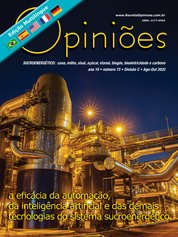Anderson Roberto Travagini
CEO da Colombo Agroindústria
OpAA73
Arquiteturas de comando avançadas
Coautoria: Helio Luis Pavani, Diretor Industrial da Colombo Agroindústria
Arquiteturas da automação: A Colombo Agroindústria, hoje com três unidades produtoras no interior do estado de São Paulo, nas cidades de Ariranha, Palestina e Santa Albertina, está em constante busca por inovação tecnológica e automação, dentro do seu projeto para a Indústria 4.0.
Arquiteturas da automação: A Colombo Agroindústria, hoje com três unidades produtoras no interior do estado de São Paulo, nas cidades de Ariranha, Palestina e Santa Albertina, está em constante busca por inovação tecnológica e automação, dentro do seu projeto para a Indústria 4.0.
A segurança de seus colaboradores e dos processos são de suma importância para a prosperidade do negócio, e a automação é caminho para tornar possível e consolidar essa premissa. As arquiteturas de automação vêm sendo estudadas pelo Grupo, de modo que fiquem padronizadas com os equipamentos de ponta, instalados em seus processos. Com a robustez necessária, garantem a agilidade dos processos, eliminando interrupções.
Atualmente, as unidades de Palestina e Santa Albertina trabalham com uma plataforma única de PLCs (Controlador Lógico Programável), cada uma com suas particularidades, com os equipamentos físicos extremamente confiáveis e de ótima performance. Na unidade de Ariranha, os investimentos estão sendo realizados para que a padronização seja finalizada até o próximo ano-safra. Redes industriais certificadas garantem fluidez e agilidade nos processos, e as ações dos operadores tornam-se instantâneas.
Trabalhando em ambiente virtual com servidores de última geração, os sistemas supervisórios atuais dão “conta do recado”, gerando uma demanda de ações para a tomada de decisão entre os diferentes setores, tudo em tempo real e sempre buscando a otimização de toda a planta industrial.
No setor agrícola, não é diferente, os maquinários adquiridos pelo Grupo, cada vez mais tecnológicos, são uma importante ferramenta no controle de emissões GEE, na garantia de produtividade e economia de insumos, buscando sempre a sustentabilidade. Pode-se afirmar que a Colombo apresenta KPIs de performance e eficiência ancorados na tecnologia e inovação; com isso, a cada processo automatizado, temos a certeza de que mais variáveis poderão ser gerenciadas, permitindo o alcance das metas estabelecidas.
Indústria 4.0 no setor industrial: No setor industrial, as melhorias de processo são otimizadas em tempo real por softwares, monitoradas pelos operadores industriais.
As ações em set points e geração de relatórios são baseadas em premissas predefinidas, a fim de garantir maiores produções, melhores resultados, sustentabilidade e segurança sempre.
Historiadores fornecem informações de forma ágil, onde é possível criar ferramentas para analisar diferentes cenários e atuar de forma eficaz, eliminando desvios de processo ou encontrando melhores cenários produtivos, com planilhas inteligentes, gerando gráficos que podem ser separados por safra, ou até mesmo entre turnos, para análise individual de performance, identificando necessidades de treinamentos ou revisões em procedimentos, garantindo a melhoria contínua do Grupo.
Com o Historian Web Admin na palma da mão com um tablet, temos todas as informações de processo em tempo real, além de ser totalmente possível analisar os dados de todas as ações tomadas pelo software ou pelo operador que antecederam algum evento escolhido.
Sistema de manutenção industrial: Buscando sistemas extremamente ágeis e seguros, com flexibilidade da execução via mobilidade e a possibilidade de integração de monitoramento em tempo real dos ativos e também informações que agregam valor e segurança nas tomadas de decisões, chegamos a um sistema de manutenção industrial fazendo do investimento um aliado estratégico para a gestão da empresa.
O sistema consegue armazenar toda a informação de diversas fontes de uma indústria para auxiliar a gestão dos processos e a automatização da rotina do setor de manutenção, alinhado ao desenvolvimento e objetivos sustentáveis da empresa.
Com início em abril/2021, a centralização dos dados, que, antes, se limitava aos diversos equipamentos e sistemas de uma indústria, agora chega a um novo cenário. O cruzamento e o armazenamento histórico dos dados oferecem inúmeras possibilidades para interpretação técnica, objetivando a antecipação de tendências e auxiliando na tomada de decisões. Tudo isso de forma sistêmica ao alcance dos técnicos. Portanto as possibilidades são imensas e as oportunidades de melhoria na gestão são cada vez mais evidentes. As inovações que vêm sendo implantadas em nossas atividades tornam os processos mais constantes e consistentes, pois elevam os limites das restrições de processo, sempre frisando a confiabilidade das operações. Essas ações fazem com que a equipe esteja sempre atualizada e focada, na melhor tomada de decisão para o processo, reduzindo custos de produção e gerando um ambiente de trabalho seguro.
A busca por uma melhor eficácia surge como uma grande preocupação em um mercado que está cada vez mais competitivo, onde há múltiplos objetivos para se atender aos múltiplos mercados do açúcar, etanol e da bioenergia.




